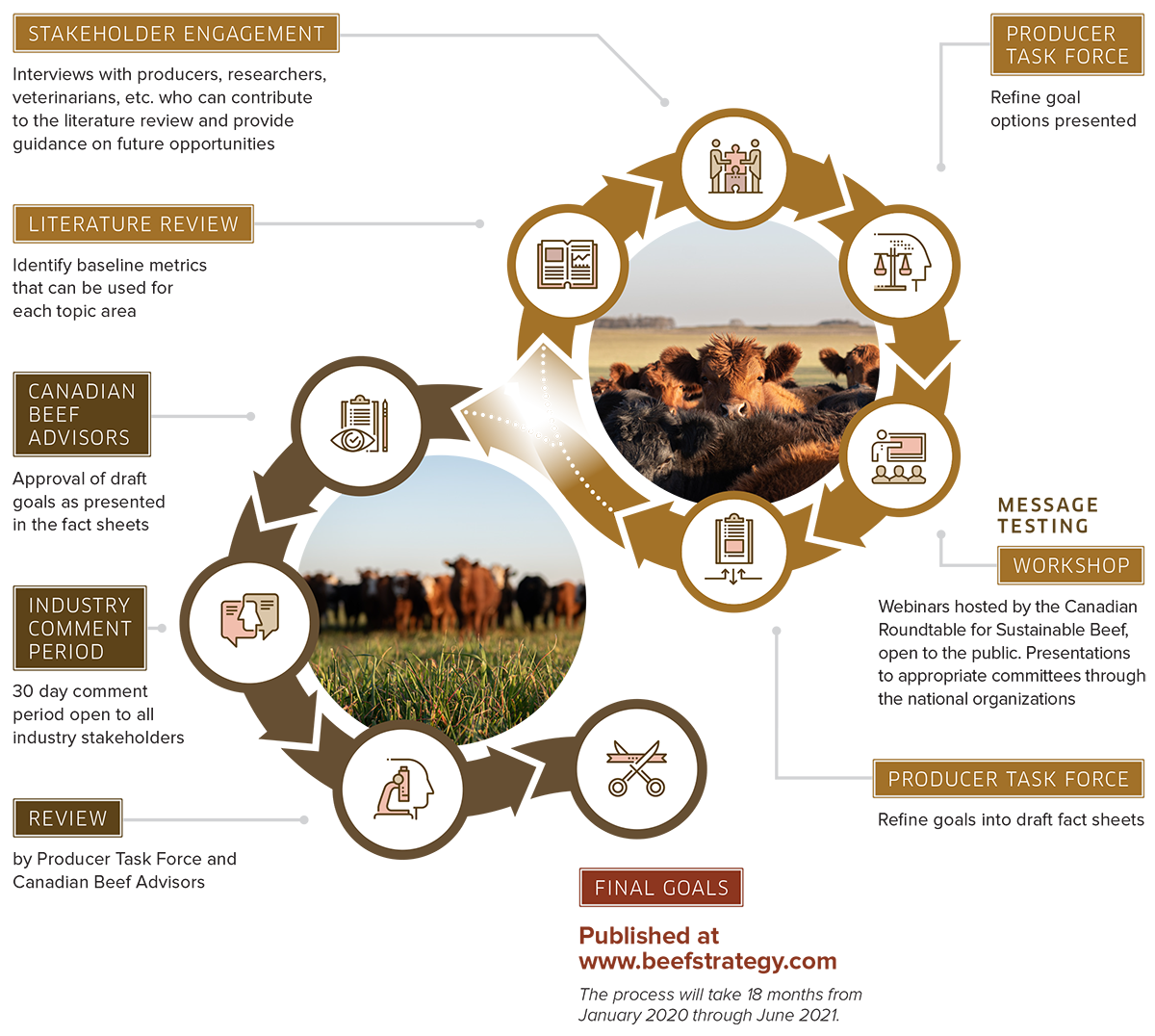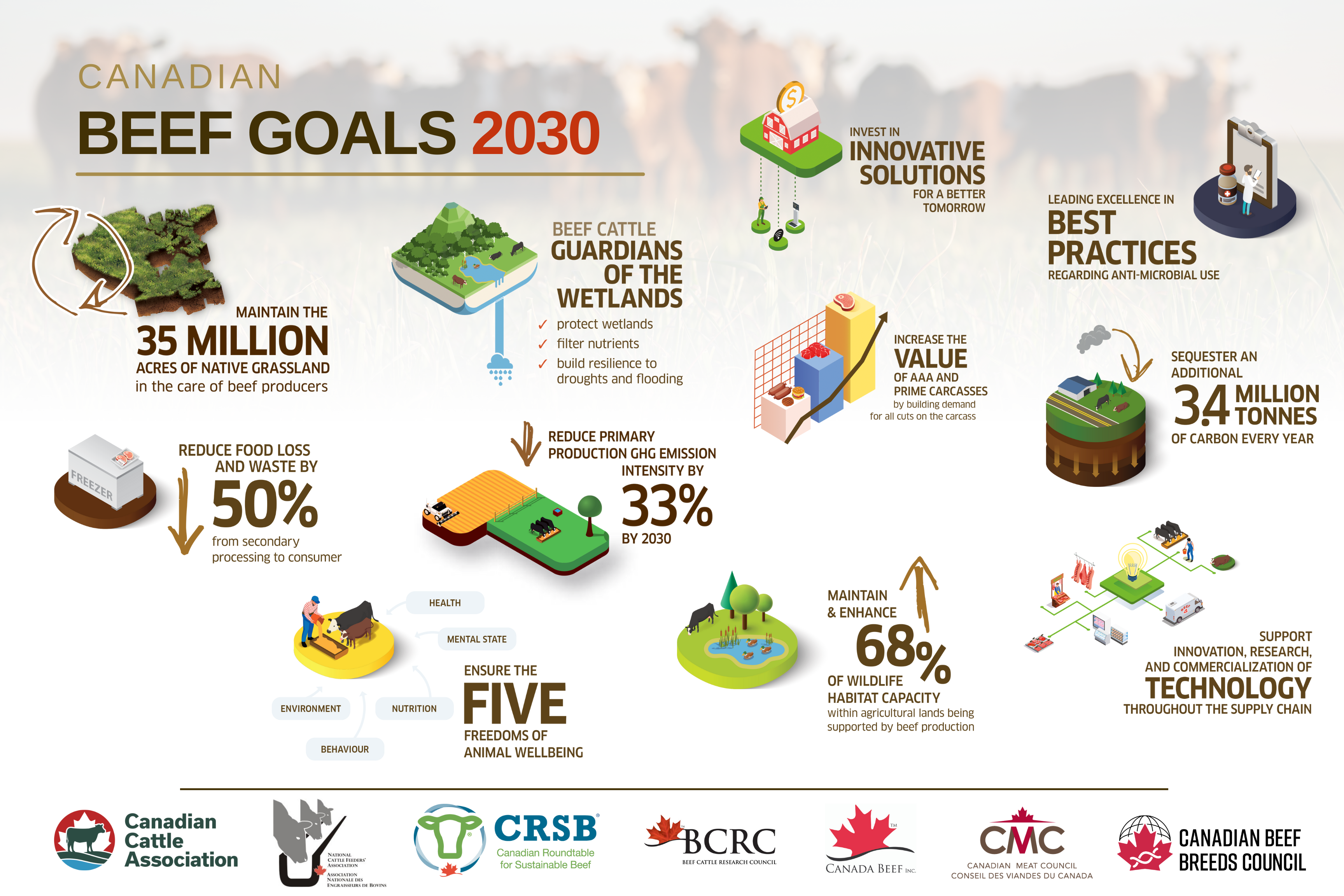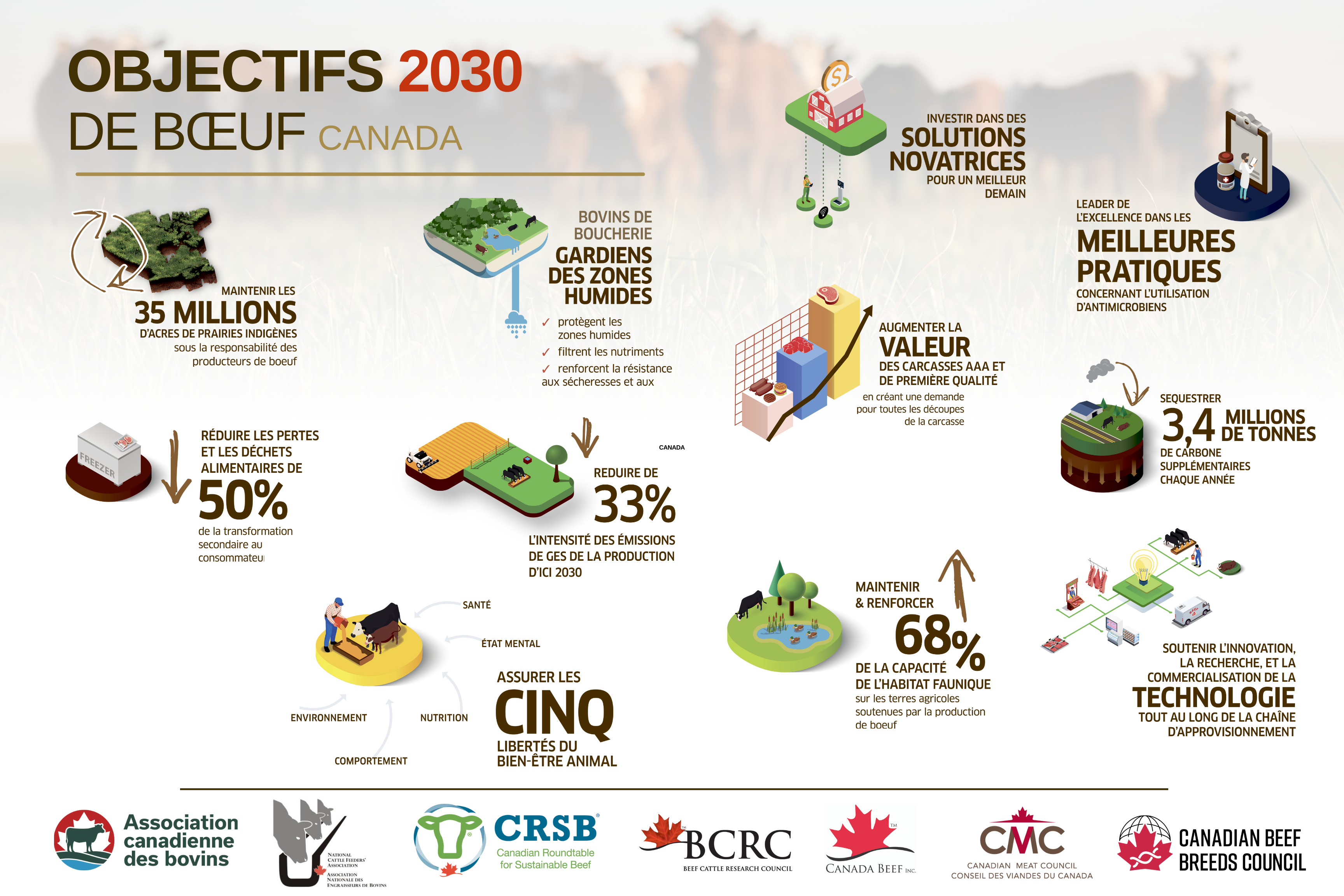Canadian Beef Advisors – Industry Goals to 2030
The Canadian beef industry is working to improve water and soil quality, support the health and safety of all people throughout the supply chain, improve beef quality, and incorporate technology to strengthen farmers’ bottom lines. Building upon five-year goals that were outlined in the 2020-2024 National Beef Strategy, the industry has now identified a suite of ambitious ten-year goals that will provide positive and clear messaging about the process to continually improve practices, product quality, enhance natural environments and utilize technologies to benefit people health, safety and profitability.
April 19, 2021 - News Release
September 16, 2020 – News Release
The first three goals released in September 2020 addressed: 1) Greenhouse Gas and Carbon Sequestrations, 2) Animal Health and Welfare and 3) Land Use and Biodiversity. The last four goals released April 19, 2021 address: 4) Water, 5) People Health and Safety, 6) Beef Quality and Food Safety, and 7) Technology. The goal topics covered recognize the breadth of benefits from beef production beyond supplying global protein demand.
How these Goals will be used
These goals will be used by the Canadian Roundtable for Sustainable Beef (CRSB) to inform the update of their Sustainability Strategy. They will also inform the Beef Cattle Research Councils (BCRC) update of the National Beef Research and Extension Strategy for 2023-28. As well as, positioning the Canadian beef industry as part of the solution on these  topics, rather than the problem, in Ottawa. In setting these goals, industry is aiming to build government and public support for beef production and its activities through a clear consistent message that addresses the challenges faced head on while also communicating its benefits.
topics, rather than the problem, in Ottawa. In setting these goals, industry is aiming to build government and public support for beef production and its activities through a clear consistent message that addresses the challenges faced head on while also communicating its benefits.
The Process
An iterative process was used to develop the proposed goals including a literature review, stakeholder interviews with researchers, veterinarians and producers that provided feedback on what was feasible for industry to accomplish. This looked at past performance recognizing that previous achievements came from multiple small incremental improvements across the system as a whole. Also recognizing that there are diminishing marginal returns with biological limits in some areas; while other areas may experience acceleration due to technology, adoption and new opportunities. Where feasible, scenarios were provided that included a continuation of historical trends and potential breakthroughs.
Preliminary options were presented to the Beef Advisors, the Canadian Cattlemen Associations (CCA) Environment Committee, the CRSB membership and a producer task force with representatives from the Beef Cattle Research Council (BCRC), Canadian Roundtable for Sustainable Beef (CRSB), CCA and National Cattle Feeders Association (NCFA) for feedback and discussion. Questions that were raised throughout the process are addressed in the FAQ section in each fact sheet.
Reporting
These goals will be reviewed and reported against with the National Strategy 2020-24. This will provide a mid-point update and opportunity to revise if new science is available.
Infographics
 |
 |
FAQs
Q: What if industry does not achieve the goals set?A: The intent is that these are “stretch” goals that encourage industry to strive for something we would not achieve without setting them. While efforts have been made to set realistic goals based on scenarios, it is possible that these goals will not be reached for a variety of reasons. Part of the reason for setting an ambitious “stretch” goal is to encourage innovation and push industry as a whole to think differently and move out of our comfort zone. The underlying principle of continuous incremental improvement should not diminish what industry achieves if the specific goal is not reached. However, it will encourage industry to explain why a goal was or was not reached, as the Canadian Beef Advisors have committed to transparent reporting to industry through the National Beef Strategy.
Q: Are these goals the only ones being set? Does this not miss the bigger picture?
A: A series of goals are being set around:
- Greenhouse gas emissions and carbon sequestration
- Animal health and welfare
- Land use and biodiversity
- Water
- Beef quality and food safety
- People Health and Safety
- Technology
Individual fact sheets provide the Goals, Context, How the goals could be achieved and FAQs.
This suite of goals covers productivity and support the delivery of a higher quality product. These goals recognize the breadth of benefits from beef production beyond supplying global protein demand.
Q: Will COVID-19 impact our ability to meet these goals?
A: We are committed to the health and welfare of our industry, our cattle and the consumers we serve. Our members are doing everything within their power to mitigate the impacts of COVID-19. We acknowledge the rapidly evolving nature of the pandemic may impact the ability to fully achieve some of these goals and we are committed to adjusting to the reality of the situation as required.
The Canadian Beef Advisors
The Canadian Beef Advisors consist of the current chair or president and senior staff of each of the seven national beef organizations responsible for policy, marketing, research and sustainability. They are a diverse group of experienced industry representatives who are leading the implementation of the National Beef Strategy on behalf of the Canadian beef industry. They are tasked with prioritizing and reaching the goals outlined in the strategy.The National Beef Strategy promotes a united approach to position the Canadian beef industry for greater profitability, growth and continued production of a high-quality beef product of choice in the world.